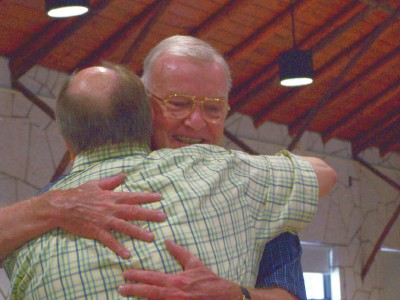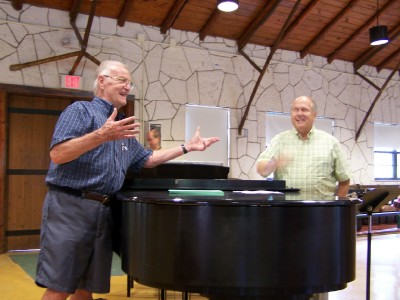 Dr. Robert R. Ball
Dr. Robert R. Ball
Sermon first presented
June 21, 1970
 |
SALT SALT SALT SALT SALT SALT SALT SALT SALT SALT SALT
SALT SALT
SALT SALT
SALT WHAT SALT IS FOR SALT
SALT SALT
SALT SALT
SALT SALT SALT SALT SALT SALT SALT SALT SALT SALT SALT
Scripture: Matthew 5:13-16
Sermon by
Dr. Robert R. Ball
Memorial Drive Presbyterian Church
Houston, Texas – June 21, 1970
If someone started to explain to you about salt, you would probably say to yourself, “oh,
brother!” Everyone knows what salt is for. But perhaps you would be surprised, as I was, to learn
that when Jesus said to his disciples, “You are the salt of the earth,” he was talking about salt in
a way that is quite different from the way we normally think of it. We think of salt as a spice, but
in the culture of Jesus’ day it was a preservative. Lacking any kind of refrigeration, they packed
their perishables in salt to keep them from becoming spoiled and useless.
The small shift in meaning makes an enormous difference in our understanding of Christ and
his Church. Almost everyone thinks he knows without any question just what the church is
supposed to be and to do. It is as familiar to us as common table salt. The Church is supposed
to make people good, to teach morals, to promote mental health, to fight communism, and to try
to get us into heaven. That understanding assumes that the Church is a spice, adding better
flavor to life; but Christ says the Church is a preservative. It exists to preserve human life from
rotting and becoming useless.
As we live it out in our lives, the Gospel has serious things to say to us about morals, about
healthy personality, about the repressions of Marxist Communism, and about the life Christ
promises to us beyond the grave – BUT THESE ARE NOT WHAT THE GOSPEL IS ABOUT !
THE GOSPEL IS ABOUT PRESERVING OUR HUMANITY ! God created us to be human
beings, but when we get blocked off in any of the basic, personal relationships of our lives, to
that extent we cease to be human. CHRIST HAS COME TO RESTORE US TO THE HUMANITY
OF THOSE BASIC RELATIONSHIPS.
He restores our relationship to God, for the person who does not live in a humble, thankful
awareness and dependence on the God who gives life ceases to be human. He restores our
relationships to other people, for the person who does not live in a mutual respect and
helpfulness with others ceases to be human. He restores our relationship with ourselves, for the
person who does not have an honest and actual regard for himself ceases to be human. To be
restored in our basic, personal relationships is what it means to be saved. That’s why Christ
came, to restore our relationships which allow us to be human.
I.
Let’s look briefly at those relationships one at a time. First, our relationship with God. THE
BASIS OF EVERY PERSON’S LIFE IS THE DECISION HE MAKES AS TO WHAT HE THINKS
GOD IS LIKE.
Even the person who says, “There is no God,” has made a decision about God that governs
his entire life. That person will live in the world assuming that it is, finally, an exercise in futility
without any lasting purpose or meaning. In such a world, it’s every man for himself. If that’s what
he believes, that’s how he’ll live. But just believing in God is no big deal. The real question is:
What do you think God is like?
I began my ministry in a small town where the religious climate was such that even the
schools were forbidden to hold dances. In spite of the tough moral code (perhaps, in part,
because of it), there was an excessively large number of teenage unwed mothers. I talked to
several of those miserably unhappy girls. Do you know who condemned them and shunned them
the most? The good church people! One of those girls actually spit in my eye when i tried to talk
to her about the God who still loved her and had good purposes for her. She had seen no
evidence of that kind of God from his people. They led her to believe she was simply a bad person;
any hope of meaningful life was over.
Christ has come that we may know God as a Person whose basic nature is love, whose
purposes for us are that we should trust his love and share it with others. That purpose cannot be
destroyed! Those who try to live according to some other purpose will only succeed in destroying
themselves and losing their humanity. That’s why worship should be the center of our lives; it
allows us to maintain the vitality and clarity of our relation to God.
Just the physical presence of this church is a daily reminder to the world that it has a God, but
it is what we do that allows the world to know what God is like. That’s why Christ calls us “the
salt of the earth.” We are to give the love that human beings must have to live and to help human
beings find their humanity through loving. As Jesus says,
“Let your light so shine before men that they
may see your good works and give glory to
your Father who is in heaven.”
But salt will sting when it hits the open wounds of prejudice and pride. People will not always
appreciate having their humanity preserved. People prefer to make up their own ideas about what
God is like so they will be free to make up any kind of life they may want. But to do so is to lose
our real humanity. It is God who has made us and not we ourselves.
Even from the cross, Christ continued to show the world what God is like. Even as he was
being killed, he was still giving God’s love and forgiveness. The hardened Roman centurion who
watched Jesus die got the message. He said,
“Surely this man was the son of God.”
II.
Secondly, the person who does not live in mutual respect and helpfulness with others ceases
to be human. We can verify that in our own experience. When something happens that causes a
rift or a loss in our relationship with a person who is important to us, we frequently will say things
like, “I feel like I am dead. Life no longer has any meaning.”
WE ALL MEASURE THE GOODNESS OR THE MISERY OF OUR LIVES IN TERMS OF
THE SATISFACTION WE FIND IN OUR RELATIONSHIPS WITH THE PEOPLE WHO ARE
IMPORTANT TO US.
The most important thing that can happen in a family is for the people in it to grow up learning
how to live with and appreciate each other. The “spoiled child” will have trouble all his life because
he goes into life expecting others to bow down to his demands. His relationships with other
people will never be satisfying. Two of America’s leading psychologists have written:
“The sure sign of a mature mind is its
ability to care.”
Christ preserves us from being “spoiled” by preserving our capacity to care. He does this by
caring about us. When a person has experienced the acceptance and forgiveness of God, he will
be able to be accepting and forgiving of others. Without that there is no possibility of any real
human relationships. The person who cannot accept and forgive simply cannot live with others.
He spends his efforts trying to defend and justify himself, which only further alienates others from
him.
God gives us his acceptance and forgiveness as a human being in Jesus Christ. The only way
that you and I really know about God’s love ia as we have experienced it in our relationships with
other people. Now it is our turn. Christ tells us that we are the “salt of the earth.” It is our task to
allow others to know God’s acceptance and forgiveness as they experience them in us. We do
this in the way we live together in families, in the way we treat others in our church and community,
in the way we do business and go to school. Where there is one grain of salt, there is healing.
Where one Christian practices forgiveness in a situation of hostility and strife, the healing power of
God is turned loose to make people whole.
The faith and determination of one person, Anne Sullivan, allowed Helen Keller to emerge from
the world of nothingness and to be a human being. Less dramatically, but just as surely, we can
open the world of relationships to the people around us. To be opened to relationships is to have
your humanity preserved. That’s the work of salt.
III.
Thirdly, unless we have an honest and actual regard for ourselves, we cease to be human.
Unless we value ourselves, we simply cannot live. When you come home at night and kick the dog
and yell at your wife and kids and sulk to your room, the person you are really down on is
yourself. When something happens that takes away our sense of confidence and self-worth,
one way or another, we take it out on other people. This isn’t as it should be, but that’s why we
call it “inhuman treatment.” That is acting in a way that is less than human. From Hitler to the
Ku Klux Klan, people who are destructive to other people are always ones who have a low regard
for themselves. They try to prove their worth and, in the process, they lose their humanity.
Sometimes we try to prove our worth by how successful we are, but that battle is never over.
If our worth depends on our success, any failure would destroy us, so we can never relax.
Sometimes we prove our worth by how good we are, which forces us to try to prove that we are
better than others, or that they are worse than we are, and to cover the tracks of our own secret
sins. Sometimes we try to prove our worth by showing how smart we are, or how popular we are,
or how “cool” we are; but it’s all a fake. There s no way our worth can really be proven.
The only thing that finally makes a person matter is to know that he is loved, to know that
some other person holds him to be of worth and value. That’s how we are saved. Christ comes to
give us the constant and unlimited love of God. Top know, through faith, that we are precious to
God is the only way we can maintain our humanity in this fickle and chaotic world.
It seems to me that it was easier to experience the love of God and to be aware of one’s own
worth in the small, close-knit community where I grew up. There, everyone knew you and you
knew everyone. Today, you and I live in the sixth largest city in America, work for big companies,
go to big schools, shop in big shopping centers, and belong to a big church. How can a person
maintain his sense of being a unique and important individual in the midst of all this encroaching,
impersonal bigness?
That’s one of the most critical challenges facing the church today – finding ways to
communicate God’s love to persons in a mass society. But we are not at liberty to give up and
say that it is simply impossible. Christ tells us that we are the “salt of the earth.” A way must be
found. Christ has given us the commission to preserve the humanity of his creation.
Whether we like it or not, bigness is the order of the day. Ninety-five percent of America’s
people live in urban areas, and the number is steadily rising. That’s the way it is.
As I was worrying about this, it suddenly occurred to me that there are certain advantages
which big families have over little ones. It occurred to me that this might be true of churches as
well. Children in big families are less apt to be spoiled, thinking only of themselves. They are
more likely to develop a sense of personal responsibility. They usually have more fun, enjoying
each other and different activities. They are almost forced to learn the lesson of sharing. They
share their rooms, their clothes, their time, their money, and even their deepest secrets. This
is a real family, and it produces real human beings.
I believe that this church has always been that kind of a family. It is my prayer that it always
will be – a big family in which the sovereign love of God stands at its very center, where the love of
Christ is shared within the family, and where the family’s efforts are directed outward to let every
person know that he matters.
That’s what the dollar-for-dollar benevolences is all about. This church spends some two
hundred thousand benevolence dollars a year in Houston, around the nation, and around the
world for the express purpose of letting people know that they matter – preserving their humanity.
That’s why people teach church school classes, coach athletic teams, work with the
fellowship groups, spend hours camping with the scouts, and sing in the choir. That’s why dozens
of our women go every week to the poverty areas and why over two dozen of our kids are using
their vacation to tutor in a black school. That’s why busy people serve on committees and tired
people make home calls and people like you and me give of our hard-earned money. That’s why
some men don’t make all the money they could, and why some women don’t go to all the parties
that they could.
Salt that doesn’t serve as salt is worthless, good for nothing but to be cast out and trodden
under the foot of man. Salt is doing its job when it gets up out of the saltcellar and does the vital
work which God has created it to do, the work of Christ, preserving the humanity of man.
MEMORIAL DRIVE PRESBYTERIAN CHURCH EXISTS TO
LET PEOPLE KNOW THAT THEY MATTER TO GOD BY
SHOWING THEM THAT THEY MATTER TO US, THAT THEY
MAY LET OTHERS MATTER TO THEM TO THE GLORY OF
JESUS CHRIST, OUR LORD AND SAVIOR.
 |
Photos of Joyful Noise/Joyful Echo Reunion, August 6-9, 2010
Allen Pote and Robert R. Ball
The instigators.
 |
>